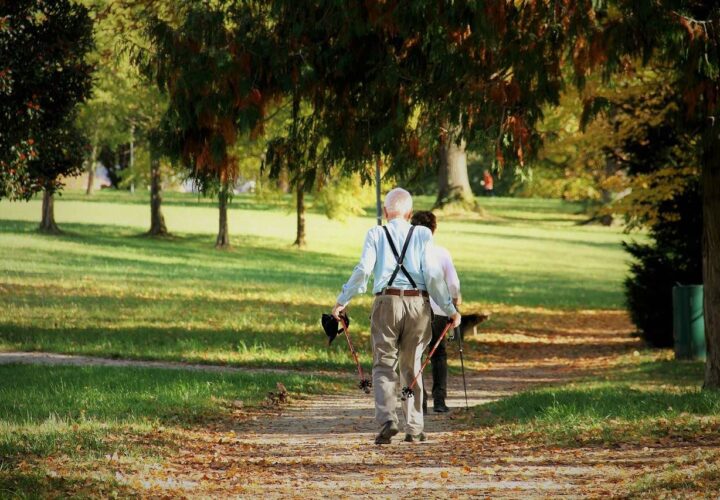A 2020 study shows that tuning into your surroundings during a walk could boost cognitive well-being.
While researchers have long known that exercise — including walking — can boost mental health, a new study shows that older adults who stay attuned to the wonders of their surroundings during a walk may reap even more health benefits.
With encouragement from researchers who urged them to practice “feeling awe” during their walks, people reported experiencing greater senses of compassion and admiration for the world around them. Virginia Sturm, an author of the study and associate professor of neurology at the University of California, San Francisco, said in a news release that this simple reminder to occasionally shift our energy and attention outward instead of inward “can lead to significant improvements in emotional well-being.”
Dacher Keltner, an author of the study and psychologist at the University of California, Berkeley, added that “awe is a positive emotion triggered by awareness of something vastly larger than the self and not immediately understandable — such as nature, art, music, or being caught up in a collective act such as a ceremony, concert or political march. Experiencing awe can contribute to a host of benefits, including an expanded sense of time and enhanced feelings of generosity, well-being, and humility.”
The researchers in the recent study published in the journal Emotion recruited 52 healthy older adults between the ages of 60 and 90, dividing them into an awe walk group and a control group. Those in the former group were instructed by the researchers to tap into their sense of wonder and orient their walks to experience awe.
Over eight weeks, the participants took selfies at the beginning, middle and end of each walk. They also answered surveys, detailing their day-to-day emotions and emotional state during their weekly walks.
People in the intervention group reported increased feelings of awe over time in their walks compared to the control group, with growing senses of wonder and appreciation for the details of their surroundings. They expressed a greater feeling that they were part of something larger in the world and displayed a “shrinking self” as they began featuring more of the scenery and less of themselves in the selfies. Over time, participants in the awe group felt more joyful during the walks, which the researchers said were mirrored in the selfies as their smiles grew bigger and more intense.
While the awe group’s elevated feelings of awe and joy did not extend beyond their walks, the participants reported greater increases in daily experiences of compassion, admiration and amusement than those in the control group. They also had greater reductions in daily distress over the course of the study.
The beneficial effects of each awe walk were modest, the researchers wrote, but even incremental gains in well-being can improve health over time.
They noted that experiences of awe can be especially beneficial for aging adults, who can often feel higher levels of fear and sadness in their mid-70s that hastens physical and cognitive decline.
Feelings of awe also have compelling effects on people’s relationships, the authors wrote, as past research shows that even brief moments of awe can help people shift their attention from the self to the outside world, putting their problems into perspective and buoying people’s sense of connection to a larger community.
“One of the key features of awe is that it promotes what we call ‘small self,’ a healthy sense of proportion between your own self and the bigger picture of the world around you,” Sturm said.
Researchers have also studied other simple interventions to improve well-being, finding that gratitude journals, acts of kindness and meditation can increase people’s positive emotions. Authors of the recent study wrote that people’s improvements of mental and physical health generally emerges over time as they become more adept with these interventions.
“Experiencing awe is such a simple practice — just taking a moment to look out the window or pausing to consider the technological marvels that surround us — and we now show it can have measurable effects on our emotional well-being,” Sturm said. “A little more joy and a little more connectedness with the world around us is something all of us could use these days.”
Contact Nicholas Chan at nicholas@beingpatient.com
